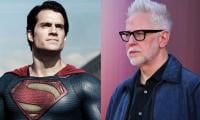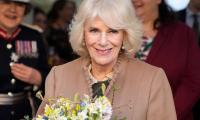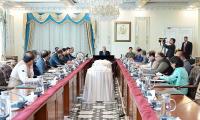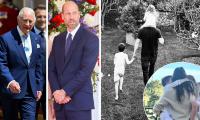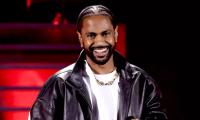Annette Bening did not initially want to make her new film. The American Beauty actress mulled over the script for Hope Gap and decided against taking the part.
“I thought it was really strong and original, painful, very well-written, but I couldn’t make it work as a film because I thought there were too many words,” the 62-year-old says over Zoom from her home in Los Angeles, where she is seated in front of a huge painting of the inside of David Hockney’s studio by the artist Damian Elwes.
“The director, Bill Nicholson, had written me a beautiful and very thoughtful letter and talked about how it was based on his own life, and my instinct at the moment was ‘I cannot tell this man that I think there are too many words, that is rude and presumptuous, so the better thing to do is just to pass’.
“So I passed, and then about a week later I thought to myself, ‘That was so stupid, why did I do that? I should have just called him up’. So I did. I just picked up the phone and called him and told him this my concern, and he said ‘Of course, don’t worry’. He’s a very charming man, and so we ended up meeting halfway in New York and we just went from there.”
The movie is based on the real-life experience of the British film-maker, who is best known as a writer for his work on Gladiator, 2012’s Les Miserables and Unbroken. Nicholson was a young man when, after three decades of marriage, his father announced he was leaving his mother for another woman, triggering a family crisis with him caught in the middle.
“It’s the end of your world, when the gods of your world, which is your mother and your father, break up,” he says. “And you’re dealing with it for the rest of your life. When you’re a child in relation to your parents, you’re always a child, and here I am, at my advanced age, and I’m still a child in relation to my parents so the therapy never ends.
“I think I’m more detached now and I was able to see it in a cooler way, and that I think made me able to be more truthful, more honest and more hopeful.”
The film stars Bening and Bill Nighy as couple Grace and Edward, while Josh O’Connor plays their son, Jamie. “What is great about director Bill is it was always quite clear that, while he was inspired by his story, he wanted it to break out of being personal,” O’Connor says.
“He wanted to make it more universal and accessible, so in a weird way it never felt like I was under pressure to be accurate with how he was or how he responded. Much like my only other experience of playing a real person on The Crown, we are fictionalising a truth, we are taking it away from that world.”
For Bening, she appreciated the way Grace responded to the shocking news that her marriage was over. “I like how impossible she is, I love that. I feel like this is what women have been complaining about in terms of storytelling, that we want women to be written in a way we somehow can identify.
“Not that every woman is like Grace, but she has these contradictions inside of her and she can be absolutely impossible and I can identify with that, I can identify with the idea that there are times that we have that response to things and that’s human and that’s part of who we are.
“But I also thought it was really important that Bill Nighy’s character and his point of view was supported completely, that both points of view could be true and then that is great dramatic conflict.”
Caught in the middle of that conflict is O’Connor’s Jamie, who is left as a sounding board and go-between for both sides.
“I always think that is the lifelong difficulty with any sort of break-up,” the 30-year-old actor says, “be it a divorce after many years of being together or even short-term break-ups, is more often than not, one person is willing to work at something and sees a glimmer of hope, or sees a way through, and the other person doesn’t and this is why it’s so hard.”
Jamie is thoughtful and sensitive and pensive, like many of O’Connor’s other roles, including as Prince Charles in The Crown, a lonely gay farmer in God’s Own Country, and half of a couple dealing with infertility in Only You.
“Inadvertently, and maybe it is because that is what’s being written, but there definitely seems to be a sort of magnetic pull somewhere in the atmosphere towards roles that are either questioning or exploring the difficulties, and benefits sometimes, of masculinity and toxic masculinity, in its most traditional forms and its more progressive forms,” he says.
“Only You had that, God’s Own Country had that in abundance, The Crown definitely has that, and when I read Hope Gap for the first time I cried. I don’t often have that reaction, but I cried. Mental health, particularly for young men, is something that I’m finding myself exploring in my own life but also through characters and that was something that really resonated in this project.”
Nicholson is now 72, and he has enough distance from the events of his 30s to be able to reflect. “Both my parents are now dead and I can kind of look back on all of that and recreate it in a way. It’s a very painful story in that anything where two people have been together for 30 years split up, that inflicts damage and that is always going to be bad, but I think the message is you can survive the loss of love, actually.
“I don’t blame my father for having left, I don’t blame Edward in the film for having left. I do blame him for having left it so long and said so little.” Hope Gap is in cinemas and on Curzon Home Cinema from August 28.
ISLAMABAD: Pakistan selectors are inching closer to finalising squads for upcoming international assignments, with the...
PFF President Mohsen Gilani and FIFA women’s football officials pose for a picture in Miami on June 22, 2025. —...
International Olympic Committee President Kirsty Coventry receives the ceremonial key from outgoing IOC President...
Pakistani Olympic players posing for photo. —Radio Pakistan/File ISLAMABAD: Pakistan marked World Olympic Day 2025...
Shaheen Afridi celebrates after taking a wicket in T20 World Cup 2024. — ICC/FileLAHORE: Lahore Qalandars have...
A representational image showing hockey players engaged in on-field practice. — AFP/FileISLAMABAD: A glimmer of hope...
